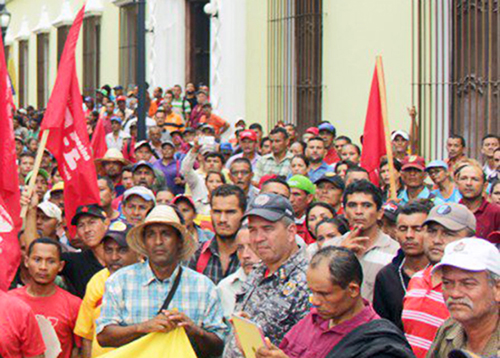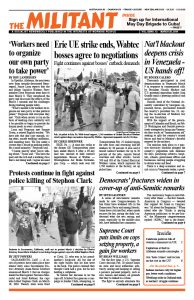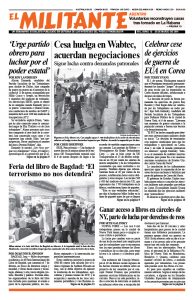
Thousands participated in rival demonstrations in Venezuela March 9 in response to counterposed calls by President Nicolás Maduro and U.S.-groomed opposition leader Juan Guaidó amid a growing political and social crisis.
Guaidó, head of the National Assembly controlled by bourgeois opposition forces, proclaimed himself the country’s president Jan. 23, saying the re-election of Maduro last year was fraudulent.
With the support of the governments of Colombia and Brazil, on Feb. 23 Washington and Guaidó provocatively attempted to bring into Venezuela four trucks of “humanitarian aid” seeking to split the country’s armed forces and lead to Maduro’s forceful removal by the military.
The marches took place as a massive electricity blackout plunged the country’s population into darkness for days, paralyzing subways, hospitals, schools, government offices and businesses, leaving people struggling to obtain water and food.
There is a deep economic and social crisis in Venezuela today, a product of the workings of capitalism and the failed course of the governments of Hugo Chávez and Maduro.
Washington has made the situation facing workers and peasants worse, imposing economic sanctions that block access by the Venezuelan government to billions of dollars in assets and revenue. The policies of the Maduro government, and of his predecessor, Chávez, seeking to “manage” capitalism, have undermined the self-confidence, political consciousness and fighting spirit of working people, who have a long history of struggle.
Communications Minister Jorge Rodríguez, Maduro and other government officials blamed the blackout on a “cyberattack” on the electronic monitoring system at the Guri hydroelectric plant. That power station supplies 80 percent of the country’s electricity.
Electricity outages are a common part of the crisis in Venezuela. In 2013 a disruption affected Caracas and 17 of the country’s 23 states for six hours, and in 2018 another outage left eight states without electricity for 10 hours. But the latest was unprecedented.
The power failure has intensified pressure on Maduro from working people, who are the most affected by the country’s deepening crisis.
Roots of the crisis
The attempts of the Chávez and Maduro governments to “regulate” capitalist relations were doomed from the start. The inevitable result was collusion with sections of the national and international bourgeoisie that benefited from the flow of oil revenue until prices collapsed, leading to the current crisis.
Workers and farmers in Venezuela have demonstrated a great capacity to fight. This was shown in mass upsurges in the 1980s and ’90s that preceded Chávez’s election in 1998, in the mobilizations that defeated a right-wing military coup against Chávez, and oil workers’ mobilizations to restart production when bosses paralyzed the industry in 2002.
There have also been numerous struggles for land, fishing rights, greater control of production and safety, and other social struggles. All of these were reported on and supported by the Militant over the years.
But instead of leading a course that would increase working-class consciousness and action against capitalist exploitation and government corruption, Chávez and Maduro have tried to act as “strong leaders” above the fray seeking to “serve the people,” providing them with welfare programs. That has blocked workers’ mobilizations and pushed them to the sidelines. The “mismanagement” and “corruption” Maduro is blamed for is a byproduct of the maintenance of capitalist relations.
This was reflected in comments made by Julio Escalona, a member of Venezuela’s National Constituent Assembly, when he spoke last December. He challenged the Food Ministry’s policy of transferring massive amounts of capital to big capitalist food monopolies, while leaving small farmers and cooperatives unable to buy supplies and actually grow food.
“[Government officials] tell us cooperatives and medium and small-sized farms don’t have the productive capacity of big enterprises, which supposedly can deliver immediate results” in increasing food availability, Escalona said. “But where are the results?”
“With all the dollars they have received and continue to receive we should be very well stocked,” he said. But everyone knows that isn’t true. He was putting a spotlight on the hoarding and speculation by these capitalist enterprises.
Washington mounts pressure
Washington has seized on the crisis to increase economic pressure, aiming to replace the Maduro government with one more to its liking. They are betting on working people growing tired of the dead-end course maintained by the political and military forces around Chavismo. At least for now, they don’t see the need to bear the costs of military intervention.
At the same time, a significant number of working people deeply distrust the opposition, who have organized violent protests, supported Washington’s sanctions and have called for U.S. troops to invade. Opposition leaders have not been able to convince Venezuelan workers and farmers that their interests are at the center of the campaign to overthrow Maduro. And they aren’t!
A common sentiment among many in Venezuela — including among former supporters of Chávez and Maduro — is captured in the view often expressed, “I would not vote for the opposition, and even less for Maduro,” if there were an election.
Despite calling their course “21st century socialism,” Chávez and Maduro consciously decided not to organize workers and farmers in Venezuela to follow the example of Fidel Castro and the Cuban Revolution — to take power, overthrow capitalism and transform society on a socialist foundation.
Working people in the U.S. can extend solidarity by demanding Washington keep its bloody hands off Venezuela, so that working people have time and space to find the road forward.

